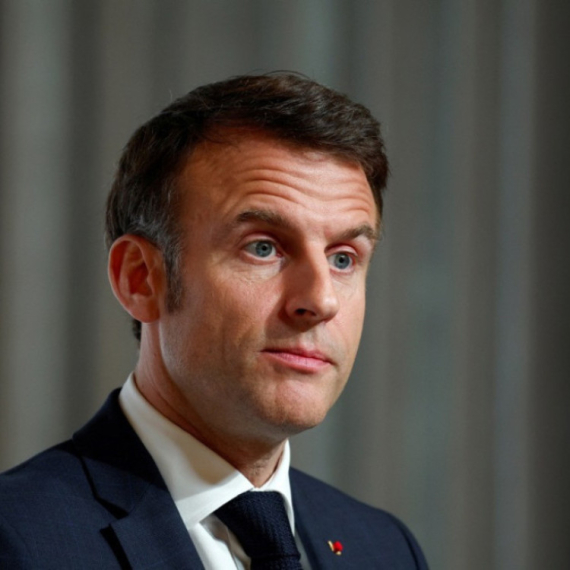Tadić: Priština can be persuaded
Pres. Boris Tadić thinks the international community has enough instruments at its disposal to persuade Priština to accept the agreement for EULEX’s deployment.
Friday, 14.11.2008.
09:34

Pres. Boris Tadic thinks the international community has enough instruments at its disposal to persuade Pristina to accept the agreement for EULEX’s deployment. “The six-point agreement that Serbia reached with the UN are the red lines below which we cannot go,“ said Tadic, stating that Belgrade would not give its blessing to anything that changed what had already been agreed. Tadic: Pristina can be persuaded He believes that the international community is able to persuade the Pristina authorities to accept the agreement drawn up between Serbia and the UN. “This kind of agreement is in Serbia’s interests and I didn’t expect it to suit Pristina. However, I expect international officials have enough instruments to convince Pristina to accept this solution,“ said the president. Tadic said that the agreement did not suit the Kosovo Albanians because they were galled by the fact that Belgrade would be involved in all dimensions of everyday life, such as in areas like customs, police, protection of cultural and religious buildings, transport, communications and issues linked to the administrative line. “The agreement allows Serbia to have a say in the situation in Kosovo, in areas populated by Serbs, and, what is particularly important, the neutral status of international officials in Kosovo is guaranteed , as is the functioning of Resolution 1244, which is the only international act that endorses Serbia’s integrity,“ said the president. He said that it was “interesting“ that certain opposition representatives in Serbia and members of the Pristina authorities were united in their criticism of the plan. “To anyone in Serbia who criticizes Serbia’s efforts to try and find a solution for EULEX’s presence in Kosovo, we would respond very clearly that this decision is taken by the UN Security Council and every decision has to be in line with Resolution 1244,“ Tadic stressed. The president said that in talks over the reconfiguration of the international presence in Kosovo, Serbia had done everything in its power and had made a significant political gesture that “has to be respected“, and that no-one would be able to accuse Belgrade of not being constructive, of blocking the process, of behaving undemocratically, or of not respecting international law. Boris Tadic (FoNet, archive) Sejdiu, Thaci maintaining opposition Kosovo President and Prime Minister Fatmir Sejdiu and Hashim Thaci say they oppose the UNMIK reconfiguration plan in its current form. This is borne out by information that the UN Security Council session on the UNMIK reconfiguration is unlikely to be held next week as talks with Pristina are still ongoing. French EU presidency spokeswoman Marine de Carne said that efforts were continuing for “all sides to accept“ the UN-Serbia six-point plan for the reconfiguration of UNMIK in Kosovo, encompassing the deployment of the EULEX mission. She said that “dialogue between the different sides is necessary“ in order to enable the EU rule of law mission to function smoothly. UN Secretary General Ban Ki-moon is due to submit a report on the reconfiguration at the session in question. Mauricio Artinano, Costa Rica’s Security Council representative, who is chairing the Security Council this month, told Tanjug that no new date for the session had yet been set. French EU presidency spokeswoman Marine de Carne said that efforts were continuing for “all sides to accept“ the UN-Serbia six-point plan for the reconfiguration of UNMIK in Kosovo, encompassing the deployment of the EULEX mission. She said that “dialogue between the different sides is necessary“ in order to enable the EU rule of law mission to function smoothly. The so-called six-point plan refers to the police, judiciary, customs, borders, protection of cultural and religious buildings, and traffic and communication. Kosovo leaders and international representatives continued intensive consultations last night. Sejdiu and Thaci met in Pristina again behind closed doors with representatives of the Contact Group member states, minus Russia. Secretary-General Ban Ki-moon is due to submit a report on the reconfiguration at the next Security Council session. Sejdiu and Thaci oppose the six-point plan designed to reconfigure the UNMIK presence and allow the deployment of the EULEX mission in majority Serb regions of Kosovo. After the latest round of talks, Thaci reiterated that unless Pristina’s conditions were met, the plan between Belgrade, New York and Brussels would not be accepted. “The position of the Republic of Kosovo is very clear: the essential element of the six points were, are, and will remain unacceptable,“ said the Kosovo prime minister. “However, in the meantime, we have sought EULEX’s reconfiguration and deployment throughout Kosovo, respecting Kosovo's sovereignty, independence and new constitution, and the plan of international mediator Martti Ahtisaari, together with guarantees of territorial integrity,“ he said. The Pristina press reports that Sejdiu and Thaci have repeated to international representatives that EULEX's deployment in the province under Serbia’s conditions is unacceptable. This view is supported by all the main Kosovo Albanian parties and associations, who believe that the Serbian plan undermines Kosovo’s independence. Former Kosovo Liberation Army (KLA) veterans have lent their voice to the criticism of the West’s attempts to coerce the Pristina authorities into accepting the conditions, stating that the six-point plan “augurs war.“ The British Embassy had no comment on the current talks still being pursued with Pristina, though they voiced their full support for EULEX.
Tadić: Priština can be persuaded
He believes that the international community is able to persuade the Priština authorities to accept the agreement drawn up between Serbia and the UN.“This kind of agreement is in Serbia’s interests and I didn’t expect it to suit Priština. However, I expect international officials have enough instruments to convince Priština to accept this solution,“ said the president.
Tadić said that the agreement did not suit the Kosovo Albanians because they were galled by the fact that Belgrade would be involved in all dimensions of everyday life, such as in areas like customs, police, protection of cultural and religious buildings, transport, communications and issues linked to the administrative line.
“The agreement allows Serbia to have a say in the situation in Kosovo, in areas populated by Serbs, and, what is particularly important, the neutral status of international officials in Kosovo is guaranteed , as is the functioning of Resolution 1244, which is the only international act that endorses Serbia’s integrity,“ said the president.
He said that it was “interesting“ that certain opposition representatives in Serbia and members of the Priština authorities were united in their criticism of the plan.
“To anyone in Serbia who criticizes Serbia’s efforts to try and find a solution for EULEX’s presence in Kosovo, we would respond very clearly that this decision is taken by the UN Security Council and every decision has to be in line with Resolution 1244,“ Tadić stressed.
The president said that in talks over the reconfiguration of the international presence in Kosovo, Serbia had done everything in its power and had made a significant political gesture that “has to be respected“, and that no-one would be able to accuse Belgrade of not being constructive, of blocking the process, of behaving undemocratically, or of not respecting international law.
Sejdiu, Thaci maintaining opposition
Kosovo President and Prime Minister Fatmir Sejdiu and Hashim Thaci say they oppose the UNMIK reconfiguration plan in its current form.This is borne out by information that the UN Security Council session on the UNMIK reconfiguration is unlikely to be held next week as talks with Priština are still ongoing.
French EU presidency spokeswoman Marine de Carne said that efforts were continuing for “all sides to accept“ the UN-Serbia six-point plan for the reconfiguration of UNMIK in Kosovo, encompassing the deployment of the EULEX mission.
She said that “dialogue between the different sides is necessary“ in order to enable the EU rule of law mission to function smoothly.
UN Secretary General Ban Ki-moon is due to submit a report on the reconfiguration at the session in question.
Mauricio Artinano, Costa Rica’s Security Council representative, who is chairing the Security Council this month, told Tanjug that no new date for the session had yet been set.
French EU presidency spokeswoman Marine de Carne said that efforts were continuing for “all sides to accept“ the UN-Serbia six-point plan for the reconfiguration of UNMIK in Kosovo, encompassing the deployment of the EULEX mission.
She said that “dialogue between the different sides is necessary“ in order to enable the EU rule of law mission to function smoothly.
The so-called six-point plan refers to the police, judiciary, customs, borders, protection of cultural and religious buildings, and traffic and communication.
Kosovo leaders and international representatives continued intensive consultations last night.
Sejdiu and Thaci met in Priština again behind closed doors with representatives of the Contact Group member states, minus Russia.
Secretary-General Ban Ki-moon is due to submit a report on the reconfiguration at the next Security Council session.
Sejdiu and Thaci oppose the six-point plan designed to reconfigure the UNMIK presence and allow the deployment of the EULEX mission in majority Serb regions of Kosovo.
After the latest round of talks, Thaci reiterated that unless Priština’s conditions were met, the plan between Belgrade, New York and Brussels would not be accepted.
“The position of the Republic of Kosovo is very clear: the essential element of the six points were, are, and will remain unacceptable,“ said the Kosovo prime minister.
“However, in the meantime, we have sought EULEX’s reconfiguration and deployment throughout Kosovo, respecting Kosovo's sovereignty, independence and new constitution, and the plan of international mediator Martti Ahtisaari, together with guarantees of territorial integrity,“ he said.
The Priština press reports that Sejdiu and Thaci have repeated to international representatives that EULEX's deployment in the province under Serbia’s conditions is unacceptable.
This view is supported by all the main Kosovo Albanian parties and associations, who believe that the Serbian plan undermines Kosovo’s independence.
Former Kosovo Liberation Army (KLA) veterans have lent their voice to the criticism of the West’s attempts to coerce the Priština authorities into accepting the conditions, stating that the six-point plan “augurs war.“
The British Embassy had no comment on the current talks still being pursued with Priština, though they voiced their full support for EULEX.


























































Komentari 39
Pogledaj komentare